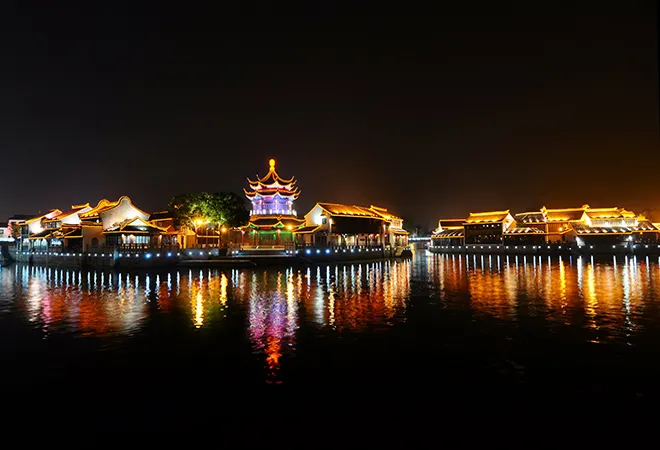-
CENTRES
Progammes & Centres
Location

Image Source: Russ Bowling
At the 2016 World Economic Forum meeting in Davos, Chinese President Xi Jinping’s speech touched a relatively softer note. He wanted to position China as an environment-friendly beacon of globalisation and free trade.
China senses an opportunity to push through its story due to the global chaos and uncertainty caused by President Donald Trump in the US and the Brexit in the European Union. China is courting everyone now -- from Philippines to Japan to Manila.
As China continues to gain economic strength at home and flexes its muscles abroad (from Africa to the Quad), it needs to tell a better story. As per a Financial Times study, soft power has become one of the most frequently used phrases amongst the Chinese power elite. Scholars argue that “there are two arms races happening in Asia today: one for the military capabilities and another for weapons of ‘soft power’.
China’s success in the use of soft power can be seen especially in two areas: tourism and international student arrivals. China managed to get well over 100 million foreign tourists in 2015. In the same year, the number of international students in China stood at 3,97,635.
China employs a multi-pronged strategy to strengthen the soft power, besides the Beijing Olympics and the Shanghai Expo.
At 135 Fuyou Street, Beijing, resides a largely anonymous compound that serves up as the war room for China’s global soft power push. The secretive United Front Work Department (UFWD) was called a “magic weapon” by Mao Zedong. Since then, the UFWD has grown in stature. It has assumed paramount importance under President Xi’s tenure. Under him, more than 40,000 people have been added to the cadre. Its aims include winning support for China’s political agenda, gathering overseas influence and gaining critical information. Its website provides very little information into its workings and its agenda. There are nine departments or bureaux to cover the entire expanse of work.
Following is the list of nine bureaux:
The United Front Work Department is also trying to capture from Tibet the process of reincarnation of the Dalai Lama. It has created a database of more than 1300 approved “living Buddhas” inside Tibet who will be called upon when the time comes to approve the Beijing’s choice. The department also works on the diplomatic relations with the Vatican. Most Chinese embassies include staff working on United Front Work Department projects.
The most important focus point for the United Front Work Department remains winning the Chinese diaspora. In Australia, for example, the Chinese Students and Scholars Association serves the political purpose of its embassy there. There are increasing numbers of political candidates of Chinese origin in the western world. In Canada, the number has jumped to 10 elected (from 44 candidates) in 2006 from 6 elected (from 25) in 2003. In 2010, it compelled the Canadian Director of National Intelligence to warn about “agents of influence” for foreign nations, hinting at China. In New Zealand, lawmaker Jian Yang (of Chinese origin) was investigated for the time (more than a decade) he spent at military colleges in China. He has served on New Zealand’s foreign affairs and defence committees.
The west worry about the “long arm of China”. There are allegations of subverting politicians, the media and universities abroad. The strategy has a singular focus -- to convince the western audience about the legitimacy of the Chinese Communist party. Florida senator Marco Rubio considers these attempts “pervasive”. According to David Shambaugh, the Director of the China Policy Programme at the George Washington University, China spends between $10bn and $12bn a year on such efforts. Leading academic publishing houses the world over are also experiencing the Chinese hard touch. The private sector gets entangled. For example, when South Korea deployed a missile-defence shield, the country’s chain Lotte suddenly found itself with fire-code violations in its China stores. China is entitled to build its soft power, as every nation is. However, its various successes get diminished due to the government’s heavy push of soft power. Soft power needs a soft touch and organic development.
The concept of soft power is an artifact of the post-Cold War world. Every major nation in the world has invested in it and continues to do so. Soft power can help a country win friends and gain influence. It is best suited for the information age.
So, it is no surprise that China has an elaborate soft power agenda. China’s importance continues to grow in the world. This is a source of great joy and pride for Chinese both at home and abroad. There is a narrative of re-birth, especially after the humiliation and dark years of the 19th century Opium Wars.
Certain limitations, however, remain. For soft power to work, a country’s narrative cannot be inconsistent with its conduct. Whether China succeeds or not in its design, only time will tell. However, other nations need to take notice and start preparing a strategy of their own to face the Chinese push.
The views expressed above belong to the author(s). ORF research and analyses now available on Telegram! Click here to access our curated content — blogs, longforms and interviews.

Vinayak Dalmia is an entrepreneur and political thinker. He has worked with the Indian Prime Minister's Office and McKinsey &: Co. Vinayak regularly writes and ...
Read More +